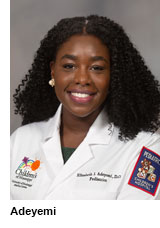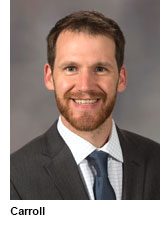The Crucible
Good morning.
Today marks a special occasion when we honor our “house staff” for the annual “Thank a Resident Day.” UMMC joins hundreds of institutions across the country in recognizing the contributions of residents and fellows.
While the rigors of medical and dental school train students in the art and science of being a health professional, residency builds upon that training through long working hours and responsibilities designed to prepare caregivers physically, mentally and emotionally for the profession. Residency is a key component of graduate health science training, and residents are an integral part of the patient care team.
We have 732 residents (medical and dental) in our programs at UMMC, and history proves that many of them will remain in the state caring for our fellow Mississippians. It has been 30 years since my own residency experience, and I learned lessons and made memories that remain with me to this day.
I thought it would be nice to hear from a couple of our current residents so I asked them to share about their challenges and opportunities, what made them choose UMMC for residency and how they maintain resilience.
 Dr. Liz Adeyemi, a third-year resident in pediatrics, said she chose UMMC because she knew she would see a vast range of patients at the state’s only children’s hospital. She was also confident in the quality of training she would receive because of the Medical Center’s reputation of developing physicians “who are competent and comfortable with caring for all acuities of illnesses.”
Dr. Liz Adeyemi, a third-year resident in pediatrics, said she chose UMMC because she knew she would see a vast range of patients at the state’s only children’s hospital. She was also confident in the quality of training she would receive because of the Medical Center’s reputation of developing physicians “who are competent and comfortable with caring for all acuities of illnesses.”
She also shared, “While there was definitely a steep learning curve early on, the challenge of managing so many new responsibilities eased as my knowledge and experience in pediatric medicine grew. Looking back as a third-year resident, I am grateful for this positive growth and for the privilege to take care of our patients with empathetic and evidence-based care. I am also appreciative of my attendings and fellow residents who are equally as passionate about pediatric medicine.”
Dr. Ben Carroll, a neurosurgery resident in year six of seven, echoed Liz’s sentiments on the challenges of residency, comparing it to a “crucible – in which you are shaped by fire and the pounding of hammers. You wake up every day and get yourself ready to be molded.”
Trial by fire is certainly one way of putting it!
 Ben added the best residents trust the process, even when it’s difficult. He acknowledged “some days you don’t feel like you’re any better at the job than you were yesterday (some days, in fact, you feel much worse), but every day you try to change in one or two ways that make you less ignorant, less selfish, more helpful, more capable.”
Ben added the best residents trust the process, even when it’s difficult. He acknowledged “some days you don’t feel like you’re any better at the job than you were yesterday (some days, in fact, you feel much worse), but every day you try to change in one or two ways that make you less ignorant, less selfish, more helpful, more capable.”
What a wonderful perspective. This is the goal of all our residency programs: to ensure we equip residents with the skills and experiences needed to excel in their profession. It’s also a time to develop relationships with peers and mentors.
I was struck by Ben’s confirmation of the relationship building that happens with colleagues who live shared experiences. He said: “We work well together as a team. Particularly among the residents, there’s a camaraderie founded on our shared pursuit of getting better every day and our belief that the training here is secretly one of the best in the nation at preparing surgeons to hit the ground running not just the day after graduation, but today.”
Growth and development as a caregiver are important to the patients we serve, but striking a balance between residency and a personal life is important to the caregiver. It is often easier said than done, but each resident must find time to enjoy life. Liz said she enjoys spending time with her husband, son and extended family as time allows.
She said, “I try to center my resiliency on discipline. I may not feel motivated at every moment, but I am determined to work and learn regardless of how I feel. Focusing on discipline helps me to be resolute, adaptable, and resilient.”
Ben said he’s still working on his work/life balance, but he finds his reward in residency in becoming the best physician for his patients.
He said, “The best residents believe that although the process is not always pleasant, every hit of the hammer today shapes a provider who will make a difference in someone’s life tomorrow.”
Wow! With such insightful and committed physicians in our residency programs, I have no doubt A Healthier Mississippi is within our grasp.



